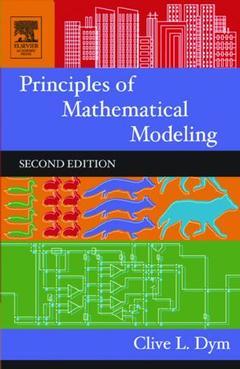Principles of Mathematical Modeling (2nd Ed.)
Auteur : Dym Clive

Science and engineering students depend heavily on concepts of mathematical modeling. In an age where almost everything is done on a computer, author Clive Dym believes that students need to understand and "own" the underlying mathematics that computers are doing on their behalf. His goal for Principles of Mathematical Modeling, Second Edition, is to engage the student reader in developing a foundational understanding of the subject that will serve them well into their careers.
The first half of the book begins with a clearly defined set of modeling principles, and then introduces a set of foundational tools including dimensional analysis, scaling techniques, and approximation and validation techniques. The second half demonstrates the latest applications for these tools to a broad variety of subjects, including exponential growth and decay in fields ranging from biology to economics, traffic flow, free and forced vibration of mechanical and other systems, and optimization problems in biology, structures, and social decision making.
Prospective students should have already completed courses in elementary algebra, trigonometry, and first-year calculus and have some familiarity with differential equations and basic physics.
Part A: Foundations 1. What is Mathematical Modeling? 2. Dimensional Analysis 3. Scale 4. Approximating and Validating Models
Part B: Applications 5. Exponential Growth and Decay 6. Traffic Flow Models 7. Modeling Free Vibration 8. Applying Vibration Models 9. Optimization: What is the Best...?
Dr. Dym is a Fellow of the Acoustical Society of America, the American Society of Mechanical Engineers, the American Society of Civil Engineers and the American Society for Engineering Education, and is a Member of the American Academy of Mechanics. Dr. Dym’s awards include the Walter L. Huber Research Prize (ASCE, 1980), the Western Electric Fund Award (ASEE, 1983), the Boeing Outstanding Educator Award (first runner-up, 2001), the Fred Merryfield Design Award (ASEE, 2002), the Joel and Ruth Spira Outstanding Design Educator Award (ASME, 2004), the Archie Higdon Distinguished Educator Award (Mechanics Division, ASEE, 2006), the Gordon Prize for Innovation in Engineering and Technology Education (co-winner, National Academy of Engineering, 2012), the Benjamin Garver Lamme Award (ASEE, 2015), and the 1st Design Theory and Methodology Award (ASME, 2015).
- Serves as an introductory text on the development and application of mathematical models
- Focuses on techniques of particular interest to engineers, scientists, and others who model continuous systems
- Offers more than 360 problems, providing ample opportunities for practice
- Covers a wide range of interdisciplinary topics--from engineering to economics to the sciences
- Uses straightforward language and explanations that make modeling easy to understand and apply
New to this Edition:
- A more systematic approach to mathematical modeling, outlining ten specific principles
- Expanded and reorganized chapters that flow in an increasing level of complexity
- Several new problems and updated applications
- Expanded figure captions that provide more information
- Improved accessibility and flexibility for teaching
Date de parution : 08-2004
Ouvrage de 303 p.
15.2x22.8 cm
Thème de Principles of Mathematical Modeling :
Mots-clés :
dimensional analysis; scale; approximations; exponential models; traffic flow models; vibration


